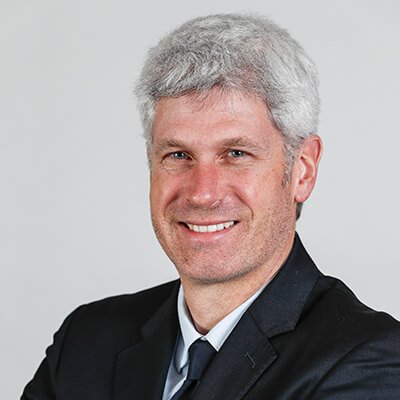The sports sector is experiencing a significant boom. The sector has been topping the news with physical activity and sport being named France’s Great National Cause 2024 (GCN2024). This initiative reflects the need to place sport and its benefits at the heart of society as essential elements of individual and collective well-being.
With this in mind, TBS Education’s Bachelor’s degree program has announced the opening of a new 3rd-year sports management program on the Toulouse campus. Designed to respond to the needs of the market, the Sports Management program is designed to introduce students to a range of professions linked to sports management, open up the sector’s possibilities, help them build a network and enable them to work in a sector they are passionate about.
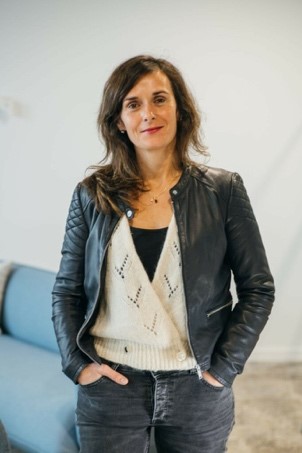
“Sport has the ability to unite, bring people together, nurture their dreams and inspire them… By drawing on its values, its social impact and its power, we will be offering students the chance to immerse themselves in the world of sport by meeting professionals from the sector, learning the fundamentals of management through innovative and inspiring experiences, visits and role-playing,” explains Alexandra Le Mouel, Head of the Sports Management program.
The objective of the program:
Enhance student skills in the 3rd year and obtain a Bachelor’s degree in Management (Diploma Bac+3 / Grade de licence) with a specialization in sports management.
Program:
- Develop basic skills in economics, law, marketing, etc., to work in sports management, sports marketing or events.
- Manage real-life projects with prestigious sports stakeholders
- Meet inspiring personalities from the sector
- Understand sport not only as a business sector, but also as a set of values and tools that provide solutions to societal challenges.
- Build a responsible career path and become a stakeholder in tomorrow’s sport, thanks to the strong CSR focus of the modules offered by the sector
- Discover other cultures and working methods by studying international sports management
“We have chosen to launch a new sports management program to respond to the needs of this booming sector. As in all our courses, the program will be based on the acquisition of a solid knowledge base and real-life, immersive experiences. Using a teaching approach directly inspired by the world of sport, the keys to its success and its fundamental values, students will be fully immersed in this environment which prepares them to become enlightened experts, aware of the challenges facing the sector,” explains Patricia Bournet, Director of the Bachelor’s program at TBS Education.

Career opportunities:
- Sports Event Manager
- Product Manager
- Project Manager
- Business Developer
- Fan experience manager
- Hospitality Manager, etc.
Following the Bachelor’s degree, students can choose to continue their studies at a Grande Ecole, including TBS Education, or at a university in France or abroad.
This program will be available on the Toulouse campus, in French, in September 2024.
Admission requirements
To apply, students must be under 28 years of age on September 1, 2024, and hold, or be likely to hold, a B+2 diploma or 120 ECTS in Management Studies at a French university.
Students studying outside France are eligible for the international distance-learning competitive entrance exam.
Application deadline: May 31, 2024
40 places available for Bachelor students and students recruited through parallel admission.
Which business schools stand out in the field of Corporate Social Responsibility (CSR)? ChooseMyCompany published its HappyIndex® AtSchool CSR Ranking which studies the CSR impact and the integration of sustainable development in the strategy of the schools. Our school has achieved 4th place in this ranking of French business schools.
TBS EDUCATION IS NUMBER FOUR AMONG BUSINESS SCHOOLS
A pioneer in this field and holder of the SD&CSR (Sustainable Development and Corporate Social Responsibility) label, TBS Education has been involved in the fields of sustainable development and corporate social responsibility since 2007.
Our school became a mission-driven company in 2021. Our vision is now enshrined in our charter and reflects our social, societal, and environmental commitments to a more sustainable and responsible economy that underpins a positive society.
“Through research with societal impact, TBS Education trains a diversity of open-minded actors who will be able to contribute to a responsible and sustainable economy within their own organizations.” – TBS Education’s vision
Taking fourth place in the HappyIndex® AtSchool CSR ranking is a strong endorsement of our school’s commitment to these issues.
A RANKING BASED ON STUDENTS’ OPINIONS
Of the 20 questions in the HappyIndex®AtSchool questionnaire, 7 questions deal directly with CSR issues and cover the following aspects:
- Students are environmentally aware
- The school is committed to a green approach
- Societal and environmental issues are integrated into the teaching
- In my school, behavior is exemplary
- The school reflects the diversity of the society in which we live
- The school seeks to develop a network of partner companies that wish to have a positive impact on the environment and/or society
- The school prepares students to have a positive impact on the world of tomorrow
This special CSR ranking focused on scoring these 7 questions to create a specific index.
Article de Christophe BERNARD (TBS Education) et Sébastien MITRAILLE (TBS Education)
Publié dans la revue : International Journal of Industrial Organization
This article delves into the intriguing dynamics of how information asymmetry impacts task allocation between a manufacturer and its supplier.
The authors specifically focus on scenarios where tasks exhibit horizontal differentiation, and the comparative edge in terms of marginal costs fluctuates throughout the production process. Our findings illustrate that the manufacturer tends to excessively outsource tasks to a generalist supplier, while not leveraging enough from a specialist supplier based on the efficiency spectrum.
The underlying driver of these patterns lies in the presence of balancing incentives. Interestingly, when the manufacturer’s internal costs are acceptably low, it opts to offload some of its high-performing tasks while keeping the underperforming ones in-house. These dual distortions occur simultaneously, thereby influencing the contract offered to the generalist supplier.

You are invited to participate in a webinar with Alex Edmans, Professor of Finance at London Business School and a leading expert on sustainable finance, about his award-winning book ”Grow the Pie: How Great Companies Deliver Both Purpose and Profit”.
The webinar will take place on Tuesday 28 March 17:00-18:00 Paris time and the moderator will be David Stolin, Professor of Finance at TBS Education.
The book, whose French edition was published last month, has been featured in numerous media outlets, including The Economist and the Financial Times. The one-hour webinar will be in English and will consist of a presentation by Professor Edmans followed by Q&A. Webinar participants will be able to ask questions through the chat function. Anyone interested in how companies can serve both society and their investors is welcome!
Dr. Soumyadeb Chowdhury, The Head of TBS Education Center of Excellence CSR and Sustainable Development and Associate Professor in Emerging Technology and Sustainability Management contributed and co-authored the Sustainability section in the 2022 Word Economic Forum Report Future Readiness of SMEs and Mid-Sized Companies: A Year On.
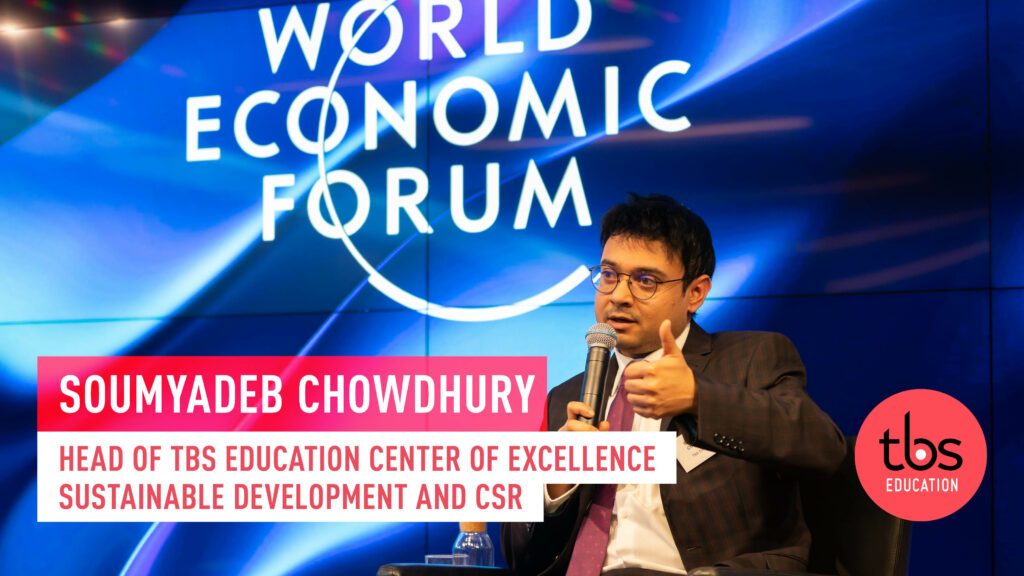
The report in its second year looks at future readiness pathways on attracting and cultivating talent that will drive digital transformation and sustainable strategies within organisations to boost business productivity and organisational resilience.
The World Economic Forum hopes to make use of the insights generated by this report to provide assistance to SMEs and mid-sized companies on their journey to becoming future-ready.
Soumyadeb Chowdhury representing TBS Education participated in a panel discussion and facilitated a workshop at the forum to co-create knowledge with the Business Champions and practitioners. The panel discussion and workshop unearthed successful and effective strategies to enhance sustainability and digital initiatives within organisations without undermining the role of employees in the evolving and uncertain business environment.
Based on the research conducted in project collaborations between Professor Prasanta Dey Aston University and TBS Education, and funded by various research councils and funding bodies, the report provides tangible recommendations that will help SMEs and mid-sized organisations in their green transition as well as systematic digital transformation in this latest second 2022 edition.
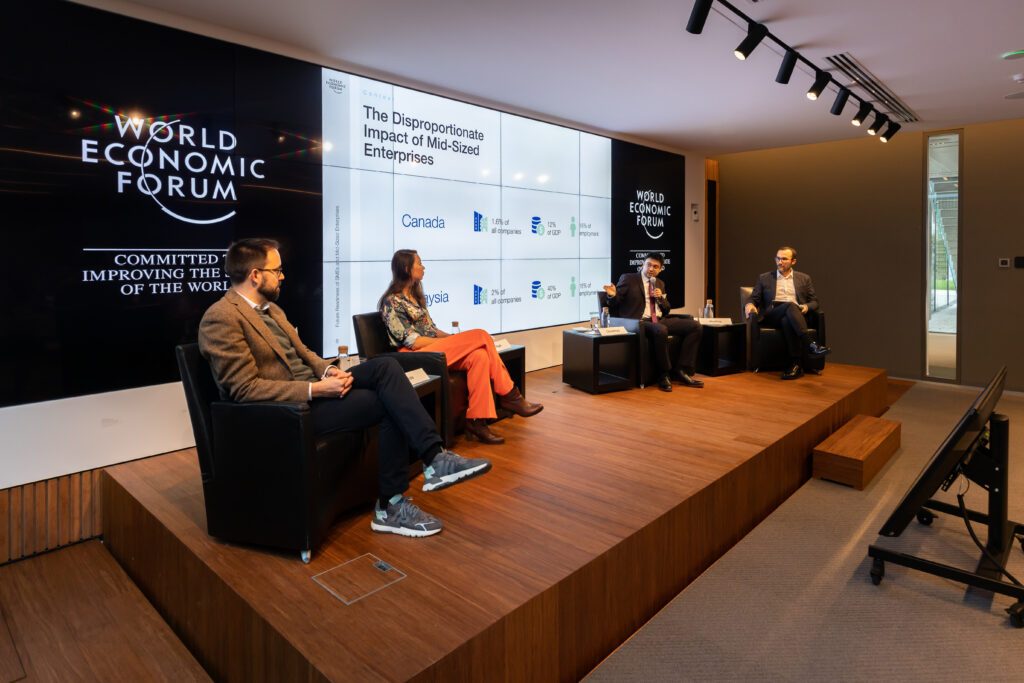
TBS Education, Center of Excellence CSR and Sustainable Development, Soumyadeb Chowdhury and Dean of Research Samuel Fosso Wamba will continue to further develop and evolve this research to include emerging themes such water footprint, sustainable resilience, disruptive sustainability, risk and resilience, supply chain diligence Industry 5.0, employee-centric low carbon practices, emerging technology and wellbeing, by extending multi-stakeholder, transdisciplinary and international collaborations.
Our school has been ranked seventh out of 58 for its commitment to the ecological transition. The accolade came in the second edition of ChangeNOW/Les Echos START 2022 ranking for Corporate Social Responsibility.
TBS Education is pioneer in this field and holder of the SD&CSR (Sustainable Development and Corporate Social Responsibility) label. We have been involved in the fields of sustainable development (SD) and Corporate Social Responsibility (CSR) since 2007.
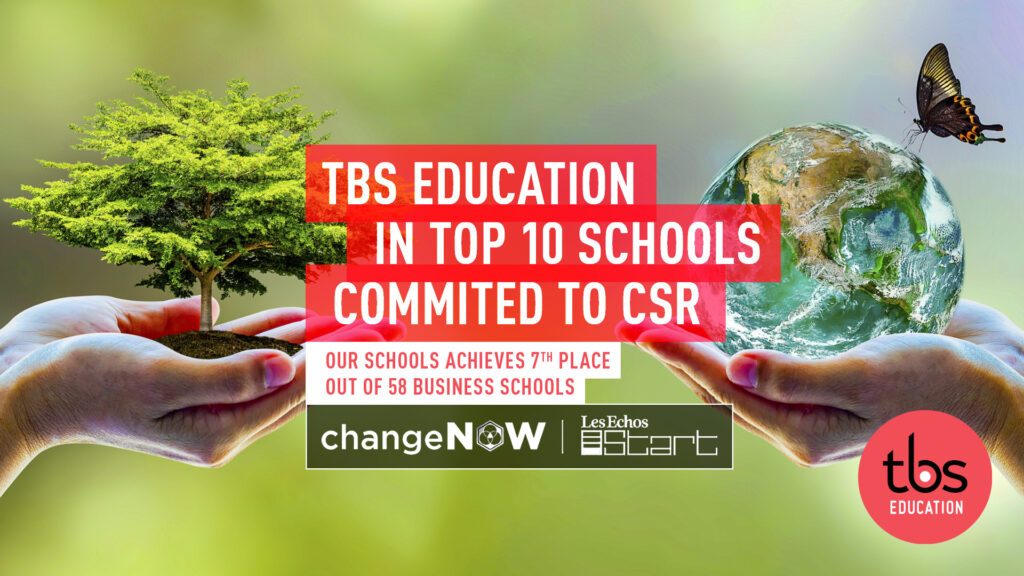
TBS EDUCATION, A MISSION-DRIVEN COMPANY
“Through research with a societal impact, TBS Education trains diverse, open and enlightened learners, who will contribute to the development of a responsible and sustainable economy within their organizations.”
— TBS Education’s vision
Our school became a mission-driven company in 2021. Our vision is now enshrined in our charter and reflects our social, societal, and environmental commitments to a more sustainable and responsible economy that underpins a positive society.
OUR SCHOOL RANKED FIRST IN 2 OUT OF 6 CATEGORIES
With a total of 112 points out of 161, our school was ranked 1st in 2 categories: alumni network and the institution’s strategy and exemplary nature. This is a significant recognition of the efforts made in recent years in terms of ecological and social transition.
The 6 themes of the ranking:
- Alumni network:
TBS Education: 1st with 12 points (out of 12)
- The institution’s strategy and exemplary character:
TBS Education: 1st with 17 points (out of 18)
- Diversity and equal opportunities:
TBS Education: 5th with 20 points (out of 29)
- Academic excellence and employability:
TBS Education: 8th with 20 points (out of 28)
- High-density impact of the program:
TBS Education: 14th with 33 points (out of 72)
- Involvement of student associations:
TBS Education: 14th with 10 points (out of 15)
SURVEY: STUDENTS IN MASTER’S IN MANAGEMENT SCHOOLS AND UNIVERSITIES PROGRAMS IN 2022
Our school is in the top five business schools for commitment to Corporate Social Responsibility (CSR). That’s according to a survey of more than 10,000 students and recent graduates. It was conducted by Harris Interactive & Toluna with L’Etudiant and Epoka: Students in Master’s in Management Schools and Universites programs.
The schools’ performance was defined according to a global index that includes 4 criteria:
- The importance of CSR in the choice of an employer
- The school’s contribution to sustainable development
- The school’s perception of CSR
Awareness of the humanitarian efforts made in the context of the conflict in Ukraine. This ranking is therefore a clear endorsement of our school’s commitment to ecological and societal transition.
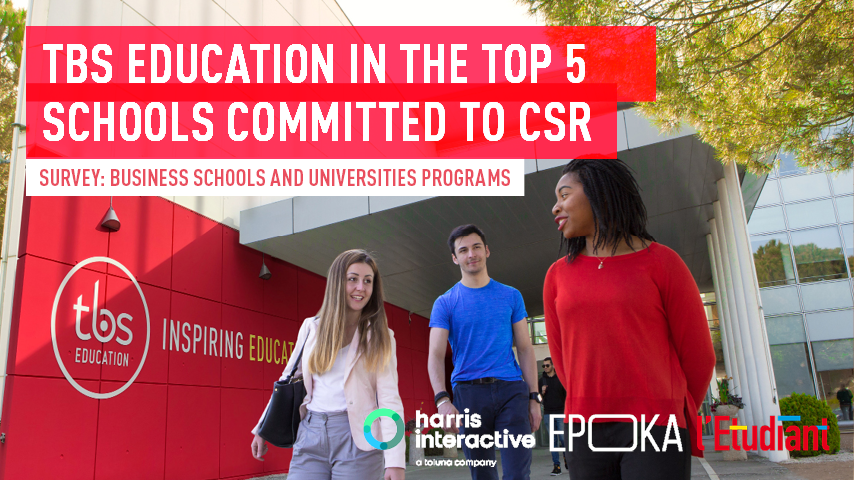
TBS EDUCATION, A MISSION-DRIVEN COMPANY
“Through research with a societal impact, TBS Education trains diverse, open and enlightened learners, who will contribute to the development of a responsible and sustainable economy within their organizations.”
— TBS Education’s vision
Our school became a mission-driven company in 2021. Our vision is now enshrined in our charter and reflects our social, societal, and environmental commitments to a more sustainable and responsible economy that underpins a positive society.
OUR MASTER’S IN MANAGEMENT PROGRAM IN TOP 10 IN TERMS OF DIVERSITY
Our Master’s in Management program is ranked 67th in the prestigious QS Business Masters Rankings 2023. It is also among the 147 best business schools worldwide, and 10th in terms of diversity. TBS Education wishes to reinforce its international openness by considering environmental issues, and aims to become an even more inclusive school in terms of social openness and disability.
“In addition to the 5-place rise of the Master’s in Management program in this international ranking, I am particularly proud to be in the world’s top 10 on this diversity criterion. This reflects both the gender balance in our classrooms and the great diversity of nationalities among the professors and students who work together in our campuses in Toulouse, Barcelona, Paris and Casablanca.” – Anne Rivière – Director of the Master’s in Management and MSc programs
National Student Conference on Sustainable Development 2022
For this 17th edition of the National Student Conference on Sustainable Development (ANEDD), on Tuesday, December 6 and Wednesday, December 7, 2022, the topic chosen is “CSR: how to act in business? Come and meet our committed graduates!”
The objective of this event is to help students discover how companies incorporate social and environmental issues into their organization and decision-making.
The Finance Crowd Analysis Project is offering an unrivaled meta-scientific view in empirical Finance. 164 research teams worked on this project, an exceptional number in this field. It involved researchers from 207 institutions and 34 countries including central bank economists.
2 TBS Education associate professors involved in #fincap
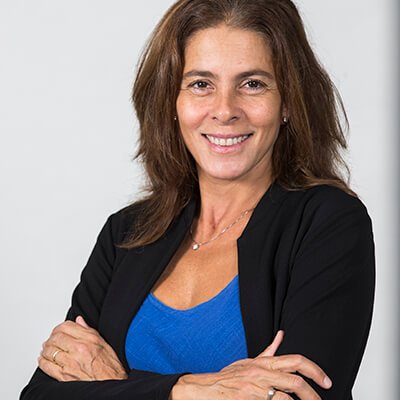
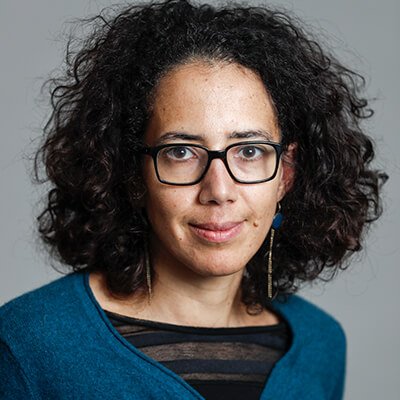
Two TBS Education associate professors, Anna Calamia and Debrah Meloso, are co-authors of the research paper Non-standard-errors coming from Fincap. Anna and Debrah are professors in the department of Economics and Finance and are affiliated to the Finance, Economics, and Econometrics research laboratory at TBS Education. Their research has focused on the functioning of financial markets and they are engaged in several other projects together.
The first crowd-sourced empirical paper in Economics/Finance
Have you ever wondered whether researchers using the same data set to address a unique research question would come to the same conclusions? Fincap tried to answer this complex question.
This innovative project attracted eminent researchers, including some from the most prestigious French finance department. Fincap was run by project coordinators Anna Dreber, Felix Holzmeister, Juergen Huber, Magnus Johannesson, Michael Kirchler, Albert J. Menkveld, Sebastian Neusuess, Michael Razen, and Utz Weitzel from the Stockholm School of Economics, the University of Innsbruck, and the Vrije Universiteit Amsterdam.
Abstract
In statistics, samples are drawn from a population in a data-generating process (DGP). Standard errors measure the uncertainty in sample estimates of population parameters. In science, evidence is generated to test hypotheses in an evidence-generating process (EGP). We claim that EGP variation across researchers adds uncertainty: non-standard errors. To study them, we let 164 teams test six hypotheses on the same sample. We find that non-standard errors are sizeable, on par with standard errors. Their size (i) co-varies only weakly with team merits, reproducibility, or peer rating, (ii) declines significantly after peer-feedback, and (iii) is underestimated by participants.
TBS Education’s Inspiring Guest project is in the spotlight for its innovative approach to teaching finance. After winning the Best Session Award at the AOM Teaching and Learning Conference and the Best Innovation Strategy Award from AMBA, it has been awarded the FMA Innovation in Teaching Award!
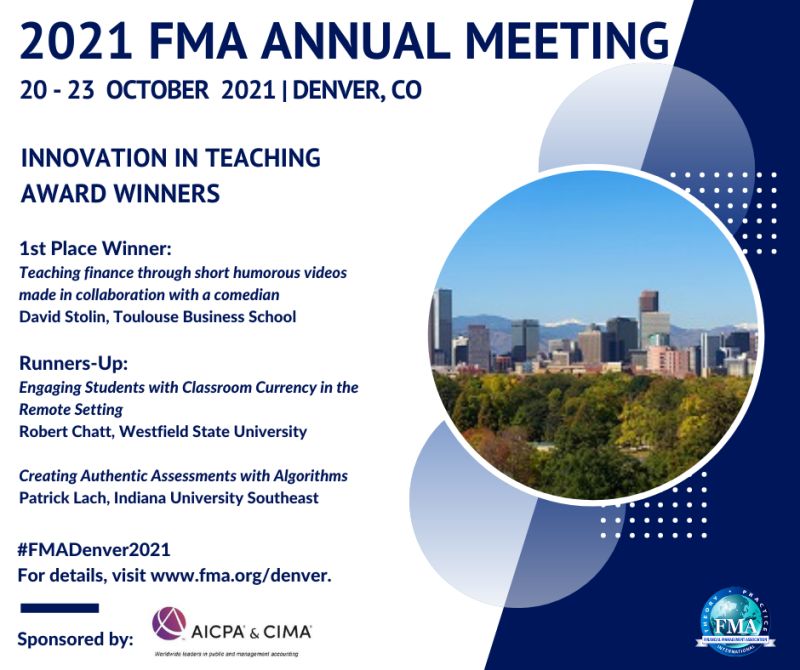
2021 FMA Innovation in Teaching Award
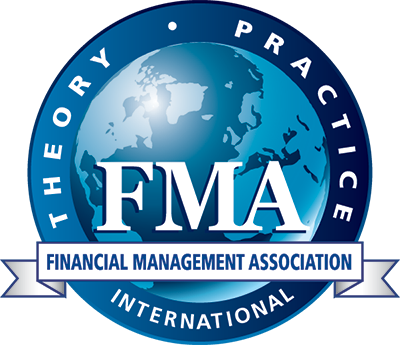
The Financial Management Association International‘s (FMA) Innovation in Teaching Award was created to recognize inspiring educators, improve the quality and relevance of education in finance and spread successful innovative practices. This international competition is open to any educator who teaches undergraduate or graduate students in finance.
The finalists are selected by a committee based on 3 criterias:
- Innovation
- Broad transferability of the teaching technique in terms of resources and instructor skills/connections
- Measurable impact on students, institutions of higher education, and the finance profession
David Stolin, co-founder of TBS Education’s Inspiring Guest program with Elie Gray, received the 1st prize for their project “Teaching finance through short humorous videos made in collaboration with a comedian”.
Injecting humor into teaching finance
TBS Education is constantly exploring unconventional teaching methods, favoring pedagogical innovation for the benefit of its students. The Business School offers a wide range of technics to acquire knowledge and prepare for the business world. By offering an innovative approach to teaching, we capture students’ attention, make the content more memorable and develop their agility.
The first edition of Inspiring Guest project is developed around educational videos staring the Californian comedian Sammy Obeid. Not only the stand-up comedian is the host of “100 Humans” on Netflix but he is also a UC Berkeley Math & Business graduate.
The success of this first edition exceeded the expectations of the pedagogical team. Fully satisfied with the outcome, the Business School is currently preparing a new exciting edition of TBS Inspiring Guest.
Gilles Lafforgue has been appointed member of the Commission on the Economy of Sustainable Development (CEDD) of the French Ministry of Ecological Transition. The title of qualified personality for his economic expertise was awarded to him in this context. Very involved in the research sphere in terms of sustainable development and recognized for his economic expertise, this professor-researcher at TBS Education had participated in the French Carbon Commission from 2017 to 2019. His involvement and the recognition of his high skills are confirmed with this new appointment.
The role of the Commission on Sustainable Development Economics
The CEDD was created on November 10, 2020 at the initiative of the French Prime Minister and the French Minister of Ecological Transition. It succeeds the Economic Council for Sustainable Development. The CEDD provides assistance to French public decision-making on sustainable development from an economic perspective.
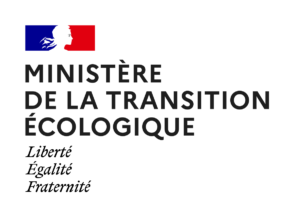
The mission of this consultative commission is to provide insight into the fields of the environment, energy and climate, transportation and housing. To do this, it relies on the analysis of statistical data and the comparison of economic analyses, the development and evaluation of public policies in these areas.
The objective of the “Environment” group
The professor-researcher will participate more specifically in the work of the “Environment” group, whose objective is to examine and discuss the economic accounts of the environment (monetary and physical flows relating to natural environments, natural resources, the circular economy, or the reduction of emissions and consumption).
